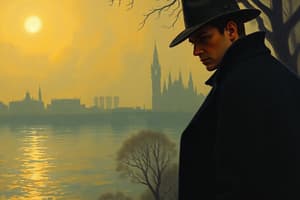Podcast
Questions and Answers
What is the mystery genre?
What is the mystery genre?
- A type of poetry
- A narrative about everyday life
- A type of fiction with a detective solving a crime (correct)
- A genre focused on romance
What does the general plot in a mystery novel focus on?
What does the general plot in a mystery novel focus on?
The crime that needs solving
Who is typically the protagonist in a mystery story?
Who is typically the protagonist in a mystery story?
The detective
Foreshadowing is a literary device that provides hints about future events.
Foreshadowing is a literary device that provides hints about future events.
What do alibis support in a mystery narrative?
What do alibis support in a mystery narrative?
What are tropes in mystery stories?
What are tropes in mystery stories?
What is suspense in the context of a mystery story?
What is suspense in the context of a mystery story?
What are inference gaps?
What are inference gaps?
What does hidden evidence refer to?
What does hidden evidence refer to?
A red herring is a clue meant to mislead the reader.
A red herring is a clue meant to mislead the reader.
Flashcards are hidden until you start studying
Study Notes
Mystery Genre Overview
- The mystery genre involves a detective or professional solving crimes, typically presented in novels or short stories.
- Often referred to as detective or crime novels.
General Plot Structure
- Focuses on the crime that requires resolution.
- Key events revolve around the investigation of the crime.
Protagonist Characteristics
- Central character is usually the detective.
- Other characters are primarily suspects in the mystery.
Literary Devices
- Foreshadowing: Hints at future events, plot twists, and character motives.
- Inference Gaps: Readers are encouraged to make connections and answer questions to piece together the mystery.
Supporting Elements
- Alibis: Evidence that supports the whereabouts of suspects during the crime.
- Tropes: Common plot devices like suspense and red herrings that enhance narrative depth and mislead readers.
Creation of Tension
- Suspense: Obscured plot details create tension, leaving both characters and readers uncertain.
- Hidden Evidence: Seemingly trivial details serve as critical clues to solving the crime.
Misleading Clues
- Red Herring: Deliberately misleading clues intended to distract or mislead the audience in their quest for the truth.
Studying That Suits You
Use AI to generate personalized quizzes and flashcards to suit your learning preferences.




